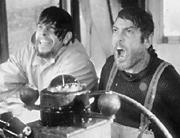THEY ALL DIE in the book, but in the big-screen adaptation of Sebastian Junger’s 1997 best-seller, who knows what happens? (That’s the studio line, as if it were The Crying Game—don’t give away the secret!) Caught in a savage 1991 storm off the coast of Nova Scotia, the Andrea Gail‘s prospects appear good under the command of Captain Billy (George Clooney). With his gray-flecked stubble, John Deere cap, and kindly eyes, he’s a figure who inspires trust and respect among his five-man crew, which includes a few thinly sketched characters plus greenhorn Bobby (Boogie Night‘s Mark Wahlberg) and family man Murph (Magnolia‘s fine John C. Reilly).
THE PERFECT STORM
directed by Wolfgang Petersen
with George Clooney, Mark Wahlberg, Diane Lane, and Mary Elizabeth Mastrantonio
opens June 30 at Neptune, Oak Tree, Pacific Place
We meet these shipmates on the bustling Gloucester, Mass., docks that Wolfgang Petersen renders like an old Marlboro magazine ad come to life. It’s a manly, colorful, working-class world—eons removed from the computer sophistication of Cruise and M:I-2. “We’re back in the 19th century,” Billy says at one point, which speaks to the romance and danger of manual labor in our high-tech age. And without the usual plot devices—no revenge motive, no kidnapped children, no murdered partners—Storm is likewise a curiously elemental throwback to Jack London and Joseph Conrad.
Why do the men endure the anachronistic risks of commercial fishing? They’re not struggling for country (as in Petersen’s Das Boot) or combatting terrorists (as in his Air Force One). Most have alimony and child support to pay, while young Bobby just hopes to set up with his girlfriend (Diane Lane). Their pointed refrain is “Let’s go make some money”—a big load of swordfish represents a cash windfall to each. But Billy’s on a cold streak, and the boat’s owner is pressuring him to make his quota. It’s a stark economic bind that few contemporary movies address. We’ve become so accustomed to sleek, affluent, cell phone-wielding protagonists that a guy hoping to buy “a new-used F-150” seems more dignified for his modest ambitions.
THUS DEPRIVED of the standard box-office rationalizations for bravery, Storm is both thin and gripping. The crew bickers, then bonds. The skipper becomes overbearing (like Ahab or Queeg), then relents. Adversity draws them together, however, and Petersen contrasts their fate in the storm with a foundering sailboat and a Coast Guard rescue helicopter. Teamwork and leadership are tested and vindicated so that the viewer actually cares about the outcome—rather than trusting that the protagonists will somehow, Cruise-like, prevail.
Their struggle to survive inevitably recalls Titanic, as Storm also features an overblown James Horner score, depends heavily on computer-generated effects, and casts young love against the cruel sea (with landlocked Lane in the Kate Winslet role). The storm is the iceberg, sheer implacable nature, and Storm achieves real drama—as opposed to Titanic‘s melodrama—by merely pitting a small boat against a big, angry ocean (instead of tuxedoed Billy Zane). Even if these “Gloucestermen” aren’t much more than types (with corny dialogue to suit), Petersen renders them like the rough-hewn heroes of How Green Was My Valley. Still, too much time is spent in port giving them the Springsteen treatment.
At sea, however, it’s more like Jaws— a few guys desperately fighting for their lives. The CGI waves look sufficiently real and intimidating, and the wide shots have the fascination of watching the Weather Channel on a much larger scale. Overhead views of the hurricane clouds are genuinely amazing, and you wish that Petersen pulled his camera back from the actors more frequently. (Sometimes it feels like we’re trapped on Das Boot again.) But he knows how to direct white-knuckle action sequences, as the Andrea Gail rides the swells like—well, there’s no other way to describe it—a roller coaster. Ultimately, the punishing, cathartic, and elegiac Storm leaves you feeling very satisfied—and very grateful that you don’t have to catch your own salmon for dinner.








